- Home
- George R. R. Martin
Old Mars Page 11
Old Mars Read online
Page 11
“That’s what we’ll be doing. First, we’ll point oars astern, then, at the command, we’ll all bring ’em forward, smooth and handsome. Then hold those oars, hold ’em for dear life, for the whole ship’ll be hanging from them!” He glanced at Sexton for confirmation and received a nervous nod. “Then listen for commands to raise or lower your oars. But only shift them a wee bit! Just like trimming sail.”
He could only see a few of the men’s faces, appearing and disappearing behind waves of flapping, rotted silk. They seemed nervous and unsure of themselves.
Yet those faces also showed hope, and trust … hope and trust in him.
Kidd set his jaw. He would prove himself worthy of that trust, or die in the attempt. “Point oars astern!” he cried, and “Fasten oars to oarlocks!”
With the best discipline they could muster, the men struggled to comply with a command that no captain had likely ever uttered before, using equipment no ship had ever seen before. The forest of oars fell astern, the patched and rotten silk strung between them flapping with a series of sharp reports like small-arms fire as the men worked to tie each oar firmly into its reinforced oarlock.
“Ready, Captain,” the bosun reported after far too long a time.
Kidd took a breath. This was the moment that would prove Sexton’s mad idea or else doom them all. “Hold water!” he cried in a bellow as firm as any he’d ever possessed. “Handsomely, now!”
The men put their backs into it, grunting with effort as they worked to lever the oars forward. Though they pressed against only air, not water, the force of the ship’s great speed on the tattered silken membrane that stretched between each pair of oars was enormous.
They were good men, the best. They’d been fed well, on the finest rations the king’s money could buy. But would even their able seamen’s strength be enough?
The ship shuddered and yawed as the oars and their burden of fabric spread gradually wider, the rushing air snapping the silk taut. Men and timbers groaned under the strain, and Kidd felt himself pressed forward as the surge of air began to slow the hurtling ship. “Steady, lads!” he called, holding tight to his hat.
Juddering, trembling, fighting like a gaffed marlin, Mars Adventure began to transform herself from a ship of the air into something like a gigantic flying fish.
By now, the great ruddy curve of Mars’s horizon had begun to straighten. A few thin wisps of cloud scudded by to either side, and even above. Sexton, bracing himself against the binnacle with his telescope, called out directions and made broad hand gestures, which Kidd fought to interpret into commands to his men. “Larboard sweeps up a point!” he called, and “Starboard, hold steady!” The roar of the wind in the rigging was deafening.
Kidd didn’t always understand what Sexton was asking him to do. He suspected that Sexton himself didn’t know either. Often the men overcorrected, or misinterpreted Kidd’s commands—commands they’d never heard before. The ship rolled and pitched violently whenever a pair of men lost control of their oar for even a moment. Yet somehow no oar snapped and no man was lost overboard; nor did the ship tumble into an uncontrollable spin. And though the water-damaged silk continued to shred, it did not fall completely to bits … at least, not yet.
Closer and closer the ship drew to the land beneath, now whipping past in a red-and-ochre blur beneath the keel. Strange mineral formations sped by on either side, fantastical shapes of orange stone like nothing Kidd had ever seen in all his travels. A broad canal filled with shining water, straight as a spar and stretching from horizon to horizon, appeared, then fell behind in a flash. And then came an astounding city—towering spires, broad streets, and just a glimpse of what might be the scuttling inhabitants. Kidd gaped at the apparition as it receded astern.
“Captain!” cried Sexton.
Kidd turned about to find a tremendous dune of red sand looming ahead, Sexton gesturing madly with his arms.
“Starboard sweeps down five points!” Kidd cried. “Larboard up five!”
The men groaned with effort as they strained to comply. The whole ship creaked and shuddered as she leaned heavily to starboard. Kidd and Sexton put their whole weight into the whipstaff, providing what little help they could with the rudder.
Ponderously, grudgingly, the hurtling ship’s course changed.
But not enough. They would not escape collision with the dune.
“All for’ard sweeps up! All aft sweeps down! Hold fast! And God save us all!”
With an enormous lurch, the prow rose up into the air, the horizon tilting madly as the ship reared back on her heel. Men cried out as the sudden change in bearing drove their sweeps hard against their bodies; one lost his grip and fell screaming down the length of the deck. Everywhere came the sound of ripping silk and the shuddering crack of tearing wood.
Kidd and Sexton scrabbled across the tilting deck to the binnacle and held on for dear life.
And then, with a horrific splintering crash, like God’s own broadside, the ship ran hard aground.
Kidd knelt in the cold sand, head bowed in an attitude of prayer. But he was not praying; he was merely resting his weary bones. Idly, he wondered if God heard the prayers of men on Mars.
The ship lay largely intact on the breast of the great soft dune of sand upon which she’d run aground. But the two lower masts had been smashed to splinters, and the hull bore two great gashes where they’d been rooted. The landing legs the carpenter had rigged had also torn away, taking with them several hull planks each. Cargo and coal lay scattered across a mile of sand. Somewhere out there, too, lay the bodies of three men who’d been thrown from the ship in the crash. Two more had died of their injuries; most of the rest were expected to recover. Kidd himself carried his left arm in a sling, counting himself lucky to have endured no more than a wrenched shoulder.
By day, the climate of Mars’s surface was not dissimilar from that of the air in the planet’s vicinity: cold and dry, with a thin wind that whistled across the vastness and whipped up dancing whirls of dust. But when the sun had set an hour after the wreck—the first darkness they’d seen after two months of sailing the shadowless air between planets—the cold had grown far deeper, biting hard even through Kidd’s heaviest coat. Most of the men had not even that much clothing to protect them. None of them had slept much, and the rising of the weak, wan sun had done little more than make the dismal situation more visible.
A chuffing sound of boots on sand made Kidd look up. It was Edmonds, the quartermaster, looking haggard and worn. “We’ve finished the inventory, sir.”
Kidd merely waited.
“There’s beef and pease for two months at half rations. But them water casks …” Edmonds shook his head. “Half of ’em sprung in the crash, sir. We’ve maybe two weeks.”
Kidd took a breath, not knowing what to say. Before he could form a reply, there came a shout from above. One of the men stood atop the ship’s prow, one foot braced on the fractured bowsprit, waving his arms and crying out words whose meaning was swept away by winds and lost in the vast thin desert air.
Awkwardly, Kidd levered himself to his feet and cupped his good hand behind his ear. “Say again?” he called.
The man made a speaking trumpet of his hands. “Martians!”
The natives somewhat resembled crabs—man-sized crabs with only four limbs, drawn out lengthwise and walking about on their hind legs. But though they had two arms and two legs, those limbs bent in all the wrong places, and both limbs and body were covered with a hard shell that shaded from white on the belly to the same red-ochre as the sand on the back. There was no distinct head, only a bulge at the top of the torso from which sprouted two black eyes on flexible stalks, like a lobster’s, and a vertical mouth like the working end of a blacksmith’s pincers. Each hand resembled a crab in itself, the fingers tipped with vicious-looking claws.
They waited in a group on the sand. There were over a hundred of them.
Kidd lowered his telescope and turned to Sexton. “D’ye s
uppose the savages speak English?”
Sexton looked terrible: his finery a shambles, wig long vanished, and cheeks gone black with stubble. “Unlikely. But they’re no savages.”
“How so?”
Sexton peered again through his telescope, and Kidd did the same. “Their clothing. Note the colors and patterns—very sophisticated. Somewhat reminiscent of Persian carpet. And especially that one in the center, the one with the hat. He appears to have jewelry at his shoulders and wrists.”
Kidd squinted, but still could not make out as much detail as the younger Sexton. “All I see is the swords.” Each native carried a long, thin sword, curved like a Persian shamshir, thrust scabbardless through his belt; smaller blades, likewise slim and curved, were also in evidence. They gleamed in the pale sunlight.
Sexton scoffed. “We are armed as well, are we not? And we are no savages.”
To that, Kidd had no reply.
Kidd did his best to hold his head high as he slogged awkwardly down the slope of soft sand, but between his injured arm and the satchelful of materials for negotiation—gold coins, glass beads, dried beef, a flask of water, a Bible—he had a hard time keeping his balance. The Martians, he noticed, had wide flexible feet well suited for walking on sand; their lower garments were loose pantaloons like the Hindoos’, cuffed at the knee, leaving the red-carapaced lower legs bare.
Focusing on these details helped keep Kidd from curling up on the sand in a terrified ball.
Sexton preceded him, holding out his open, empty hands. “We greet you in the name of King William III of England and Ireland, and II of Scotland.”
The Martian with the hat stepped forward from the rest. He had a distinct but not unpleasant odor, something between horses and cinnamon, and the bright metal fixed to his carapace at several points had the appearance of real gold. Chittering and clattering in his own language, he pointed one chitinous hand up to the sky, then swept it downward in a gesture that encompassed the Mars Adventure, the Englishmen, and the Martians as well. Then he stood silent, with folded hands.
Sexton and Kidd exchanged a glance. Even the natural philosopher was plainly baffled by this display. “Perhaps we should show him the Bible?” Kidd suggested. “He waved up at Heaven …”
“I’ve no better notion,” Sexton confessed. Kidd handed him the heavy book, and he opened it to Genesis. “This is our most sacred book,” Sexton said to the native, presenting it reverently, “and this is the story of the creation of the universe.”
The Martian took up the book, examining it on all sides with chittered commentary to his fellows. He ran crab-leg claws down the columns of text, as though reading, and tapped delicately at the leather cover and spine. He held the book close to his face, the eyes bending in together in a most disturbing manner.
Then, to Kidd’s horror, he slowly and deliberately tore out a page, folded it, and crammed it between his hideous jaws.
Rigid with mortification, Kidd and Sexton could do nothing more than stand and stare round-eyed as the Martian chewed and swallowed the page with an apparent attitude of careful contemplation. No London gourmand in his favorite club had ever sampled a glass of wine with such keen attention. Even the black and lidless eyes appeared to lose focus, the native seemingly concentrating on the flavor of the vellum and ink.
Sexton was nearly vibrating with rage. “That is the word of the Lord!” he spat.
Kidd, too, was offended, but not so much as Sexton, and he was keenly aware of the dozens of armed Martians who had moved in to surround them on all sides. “Easy, Doctor,” he muttered low, putting a hand on Sexton’s shoulder.
With a visible effort, Sexton calmed himself. But Kidd had to physically restrain him when the Martian tore out a second and a third page, tearing each one into smaller bits and sharing them out among the other Martians nearby.
“It seems they find the word of our Lord quite … palatable,” Kidd said as he held Sexton back with his one good arm across Sexton’s narrow chest. He himself was so stunned by the Martians’ blasphemous feast that he felt near to breaking out into a fit of hysterical giggles.
Sexton took a deep breath, then patted Kidd’s hand. Kidd released him. “Forgive them, Lord,” Sexton said, casting his eyes heavenward, “for they know not what they do.”
While the two men had been talking, the lead Martian had handed the Bible to one of the others. A third native now came forward bearing a squat glass bottle, which the leader took and presented to Sexton. Spiraling marks, possibly writing, were etched into the bottle’s surface; the contents were a deep amber in color.
Sexton and Kidd exchanged a quizzical look. It was Kidd who removed the stopper, which was made of some kind of flexible resin, and delicately sniffed the liquid within. He quirked an eyebrow, not trusting himself to speak, before tasting.
The flavor was unusual, with hints of ginger and pine, but the rich mellow burn as the liquid slid down Kidd’s throat was so familiar that a tear stung his eye.
“It’s not quite Ferintosh,” he said to Sexton, “but damn me, that is fine whisky!”
Sexton blinked, then turned and bowed to the Martian. “It seems we have a basis for commerce,” he said.
Kidd warmed his hands over a Martian prince’s fire, marveling at how very far he’d come from Newgate Prison.
Despite the difficulties of communication, the Martians had been eager to trade their goods for books, belts, and anything else made of leather. The Martian meats were palatable, though spicy and a bit gamey in flavor, and Kidd and his men had been allowed the use of a small rounded building that appeared to have been carved seamlessly from a single piece of sandstone. Sexton theorized that the “stone” was in fact merely sand fused together with the Martians’ own saliva, but Kidd tried not to think about that.
As for Sexton, he was as happy as a clam at high tide. He occupied himself studying the Martian flora and fauna, the language, and astronomy—he said he’d found that the planet had two tiny moons. He seemed perfectly content to remain here for the rest of his life.
But the ship’s stores of acceptable trade items were limited. Some of the men had had success exchanging their labor and entertainments, such as playing on the pennywhistle, for the Martian liquor and other sundries, but they couldn’t go on like this forever. Already, Kidd thought, the Martian with the hat was beginning to cast inhospitable looks upon them with his protuberant black eyes.
Kidd stood up from the fire pit and made his way across the crowded common room to where Sexton sat studying one of the Martian “books”—a long spool of thin steel etched with spindly writing. Martian steel was plentiful and much better than English steel, easily the equal of the best Spanish steel.
Sexton sat engrossed for some time before noticing Kidd’s presence. “I think this may be a verb,” he said, holding up an inscribed strip of metal.
“I have a question for you,” Kidd said. “Of natural philosophy.”
“Oh?”
“Come outside with me.”
The two of them drew cloaks about themselves—rich, soft cloaks of the brightly colored Martian fabrics—for the tiny weak sun was long vanished from the sky. The street outside was quiet and very dark, the Martians being generally stay-at-homes at night, and a million stars stared down unwinking.
“Which of them is the Earth?” Kidd asked, clouds of breath puffing from his mouth.
Sexton looked upward for a moment, then pointed. “Just beyond the eastern horizon, I believe. She should rise within the hour.”
“I see.” Kidd gazed in the indicated direction. “What would it take to get there?”
“New balloons, of course,” Sexton replied without hesitation. He’d plainly considered the question in detail already, if only as an intellectual exercise. “But there’s plenty of this fine fabric available.” He rubbed his cloak between two fingers. “Food and water can be obtained from the natives, likewise coal to heat air for the ascent. The biggest problem is replacing the masts.”
“Aye, the masts.” The Martians did not seem to use wood for construction at all. In this city of stone and steel, they’d seen no wood bigger than kindling.
“And repairing all the other damage from the crash. But the masts are the sticking point.” Sexton clapped Kidd on the shoulder. “Still, it’s not so bad here, eh? Now come inside. ’Tis cold.”
“In a moment,” Kidd replied.
While Sexton returned to his books, Kidd stared off to the east, as though he could will the bright blue star of Earth to rise more quickly.
Kidd grubbed through the box of knuckle-roots near the fire pit, looking for the ones that were the least scrawny and fibrous. The white, knobby roots were tough and flavorless, but the Martians too cared little for them; a hundredweight could be obtained for just a few hours’ labor. Kidd suspected the roots of being animal fodder but preferred not to inquire too deeply into the question. They were keeping him and his men alive.
The ship’s books and leather had all been eaten weeks ago, putting an end to trade for luxuries such as meat and rum and sweets. But water and wood had to be hauled on Mars as well as anywhere else, and the men, with the Earthborn muscles of able seamen, could lift and haul far more than any Martian. There were things to herd, which were nothing like sheep and yet acted very much like sheep, and the canals required constant maintenance. All this work kept them supplied with food, of a sort, and water and coal. But it was no life for a sailor.
Selecting several roots from the pile, Kidd prepared to roast them, but when he went to stoke the fire, he found the cloth basket that served as a coal scuttle empty. Kidd cursed; bad as they were when roasted, raw knuckle-roots were completely inedible. “Sexton,” he called, tossing the basket his way. “Bring us some coal from the pile, would you?”
While he waited for the coal, Kidd arranged the roots in the fire pit, bemoaning his fate. But by the time he’d placed the last root, Sexton and the coal had still not appeared. “Damn you, man,” he called over his shoulder, “what’s the delay?”

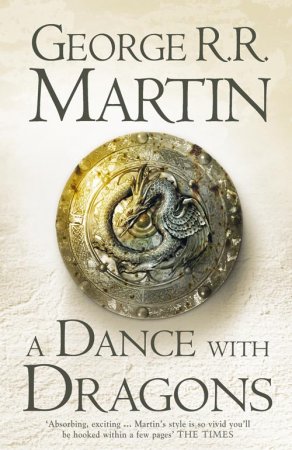 A Dance with Dragons
A Dance with Dragons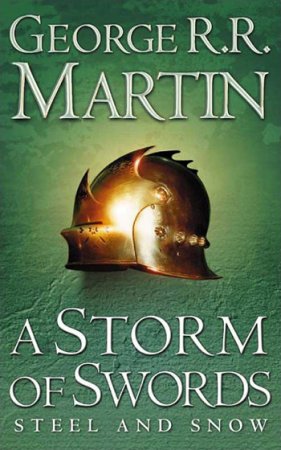 A Storm of Swords
A Storm of Swords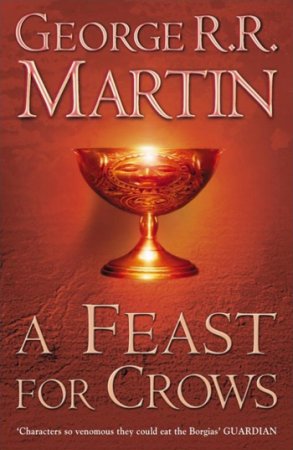 A Feast for Crows
A Feast for Crows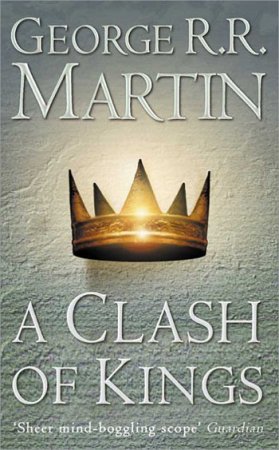 A Clash of Kings
A Clash of Kings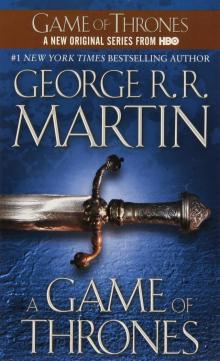 A Game of Thrones
A Game of Thrones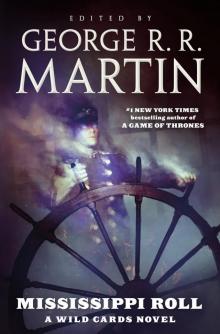 Mississippi Roll
Mississippi Roll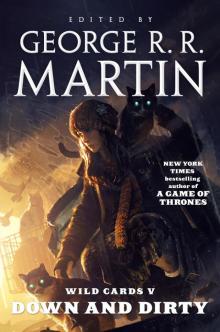 Wild Cards V: Down and Dirty
Wild Cards V: Down and Dirty Busted Flush
Busted Flush When the Devil Drives
When the Devil Drives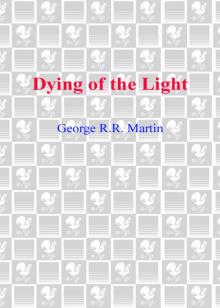 Dying of the Light
Dying of the Light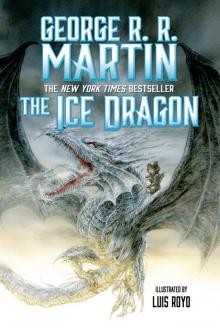 The Ice Dragon
The Ice Dragon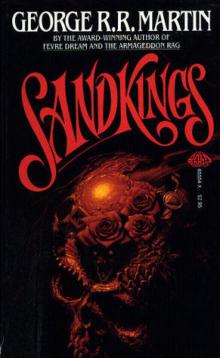 Sandkings
Sandkings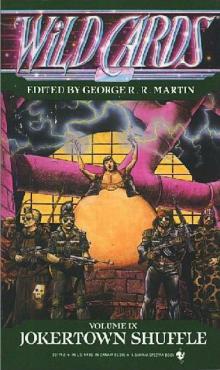 Jokertown Shuffle
Jokertown Shuffle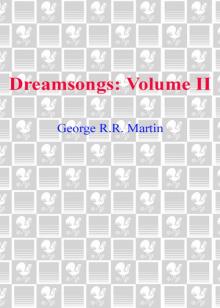 Dreamsongs. Volume II
Dreamsongs. Volume II Deuces Down
Deuces Down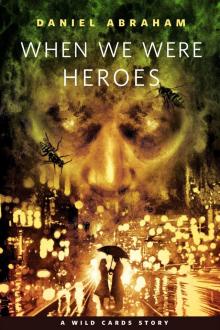 When We Were Heroes
When We Were Heroes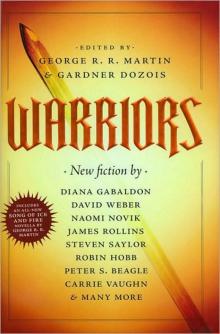 Warriors
Warriors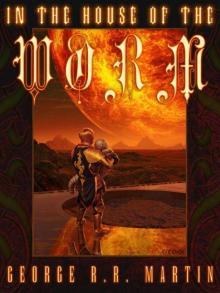 In the House of the Worm
In the House of the Worm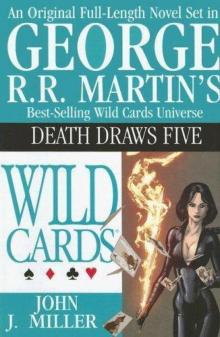 Death Draws Five
Death Draws Five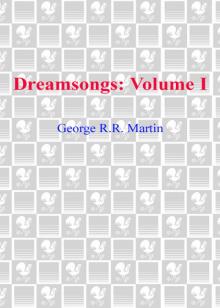 Dreamsongs. Volume I
Dreamsongs. Volume I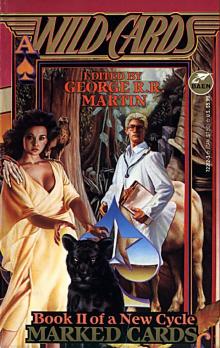 Marked Cards
Marked Cards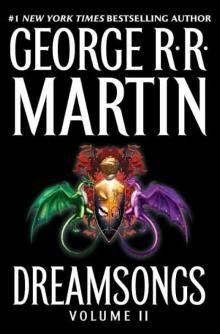 Dreamsongs
Dreamsongs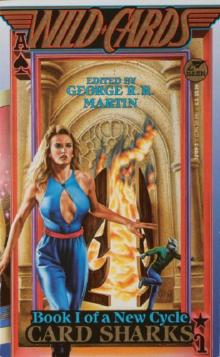 Card Sharks
Card Sharks Dangerous Women
Dangerous Women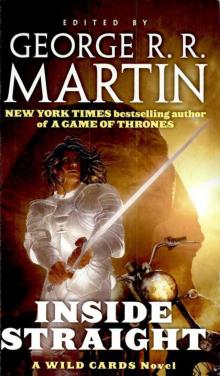 Inside Straight
Inside Straight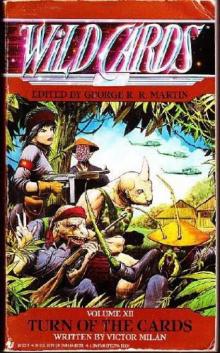 Turn of the Cards
Turn of the Cards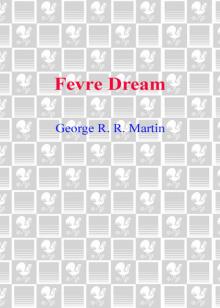 Fevre Dream
Fevre Dream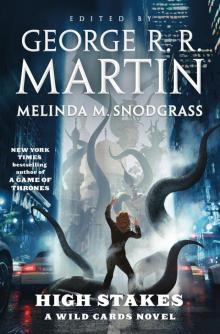 High Stakes: A Wild Cards Novel
High Stakes: A Wild Cards Novel Windhaven
Windhaven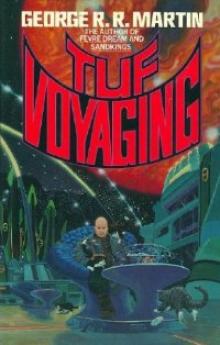 Tuf Voyaging
Tuf Voyaging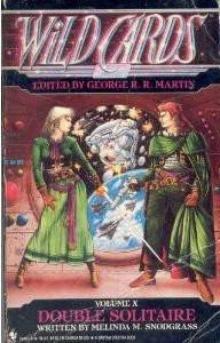 Double Solitaire
Double Solitaire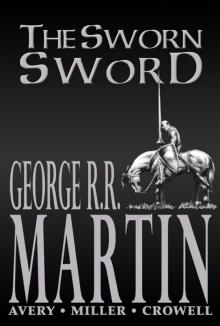 The Sworn Sword
The Sworn Sword Low Chicago
Low Chicago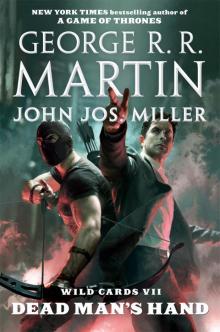 Dead Man's Hand
Dead Man's Hand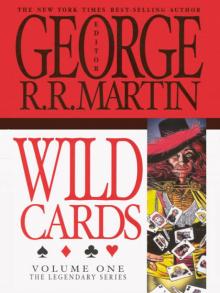 Wild Cards
Wild Cards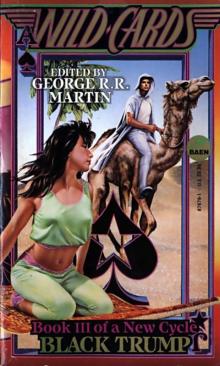 Black Trump
Black Trump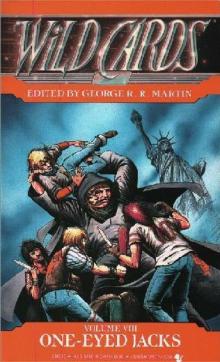 One Eyed Jacks
One Eyed Jacks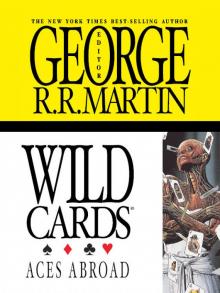 Wild Cards: Aces Abroad
Wild Cards: Aces Abroad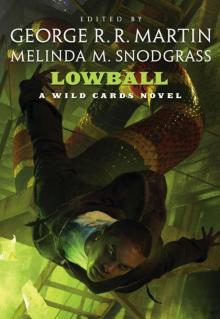 Lowball: A Wild Cards Novel
Lowball: A Wild Cards Novel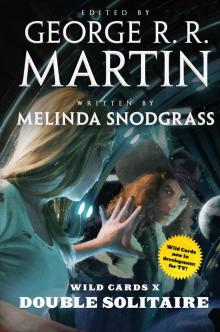 Double Solitaire (2019 Edition)
Double Solitaire (2019 Edition)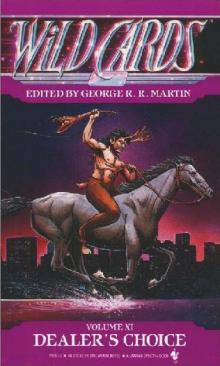 Dealer's Choice
Dealer's Choice Ace in the Hole
Ace in the Hole A Song for Lya: And Other Stories
A Song for Lya: And Other Stories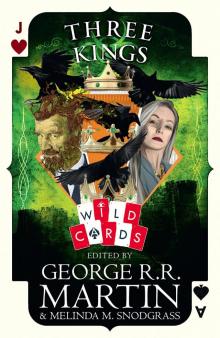 Three Kings
Three Kings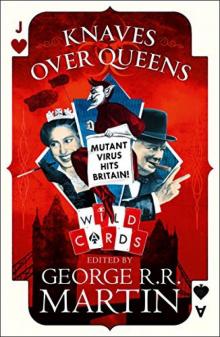 Knaves Over Queens
Knaves Over Queens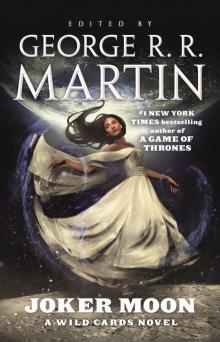 Joker Moon
Joker Moon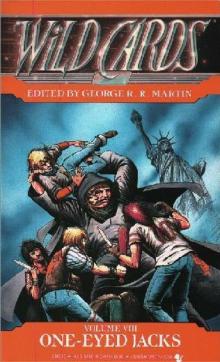 One Eyed Jacks wc-8
One Eyed Jacks wc-8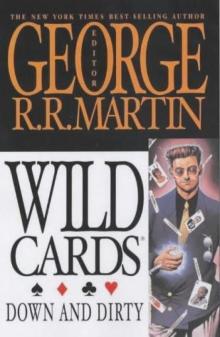 Down And Dirty wc-5
Down And Dirty wc-5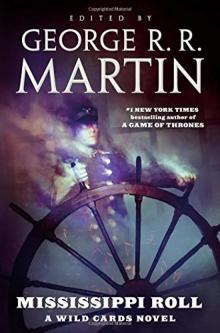 Mississippi Roll_A Wild Cards Novel
Mississippi Roll_A Wild Cards Novel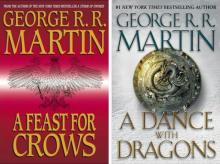 A Feast for Dragons
A Feast for Dragons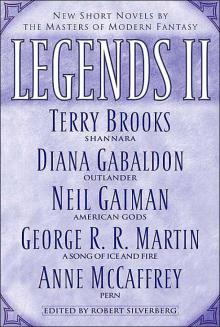 The Sworn Sword ttodae-2
The Sworn Sword ttodae-2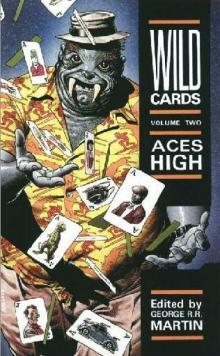 Aces High wc-2
Aces High wc-2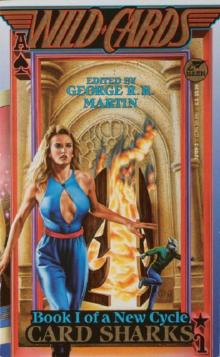 Wild Cards 13 : Card Sharks
Wild Cards 13 : Card Sharks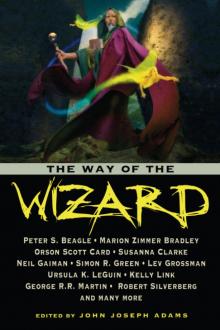 Way of the Wizard
Way of the Wizard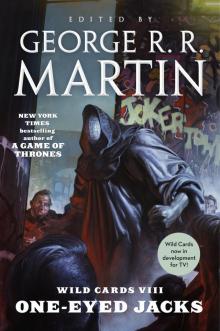 Wild Cards VIII: One-Eyed Jacks
Wild Cards VIII: One-Eyed Jacks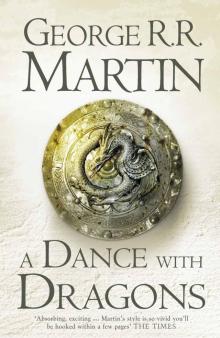 A Dance With Dragons: Book 5 of A Song of Ice and Fire (Song of Ice & Fire 5)
A Dance With Dragons: Book 5 of A Song of Ice and Fire (Song of Ice & Fire 5) The Princess and The Queen, Or, The Blacks and The Greens (a song of ice and fire)
The Princess and The Queen, Or, The Blacks and The Greens (a song of ice and fire)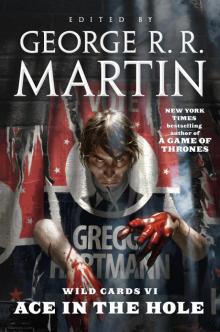 Wild Cards VI--Ace in the Hole
Wild Cards VI--Ace in the Hole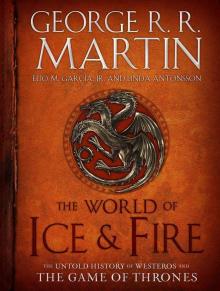 The World of Ice & Fire: The Untold History of Westeros and the Game of Thrones (A Song of Ice and Fire)
The World of Ice & Fire: The Untold History of Westeros and the Game of Thrones (A Song of Ice and Fire)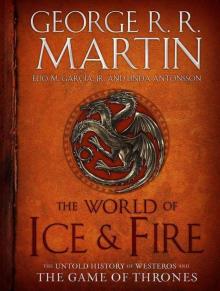 The World of Ice & Fire: The Untold History of Westeros and the Game of Thrones
The World of Ice & Fire: The Untold History of Westeros and the Game of Thrones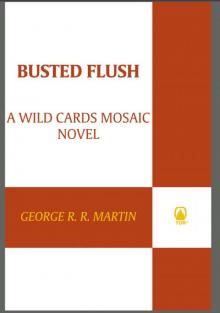 Busted Flush wc-19
Busted Flush wc-19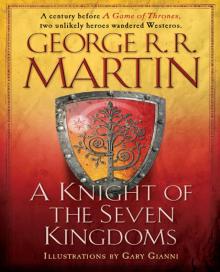 A Knight of the Seven Kingdoms
A Knight of the Seven Kingdoms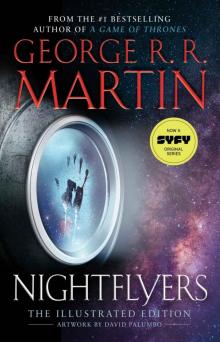 Nightflyers: The Illustrated Edition
Nightflyers: The Illustrated Edition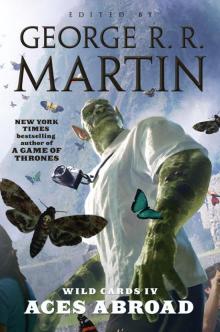 Wild Cards IV
Wild Cards IV Portraits of His Children
Portraits of His Children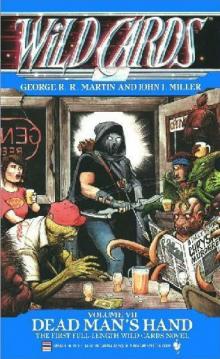 Dead Mans Hand wc-7
Dead Mans Hand wc-7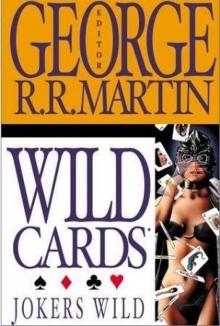 Jokers Wild wc-3
Jokers Wild wc-3 The Lonely Songs of Laren Dorr
The Lonely Songs of Laren Dorr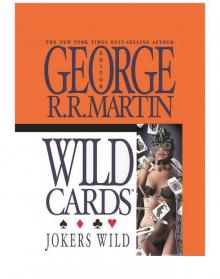 Wild Cards III: Jokers Wild
Wild Cards III: Jokers Wild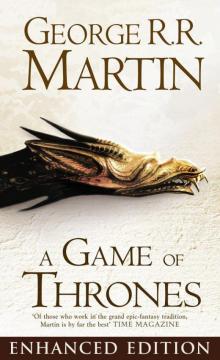 A Game of Thrones Enhanced Edition
A Game of Thrones Enhanced Edition Nightflyers & Other Stories
Nightflyers & Other Stories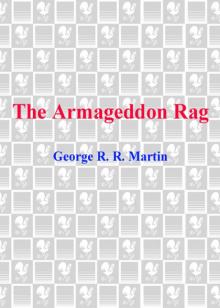 Armageddon Rag
Armageddon Rag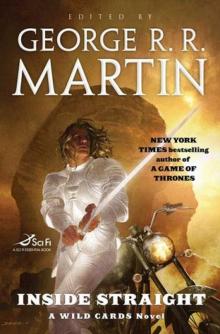 Wild Cards: Inside Straight
Wild Cards: Inside Straight A Song for Lya
A Song for Lya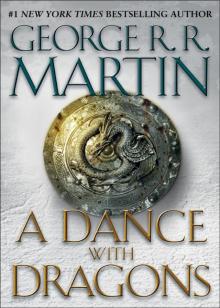 A Dance with Dragons: A Song of Ice and Fire: Book Five
A Dance with Dragons: A Song of Ice and Fire: Book Five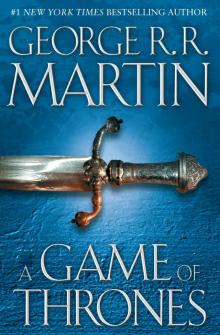 Song of Fire & Ice 01 - A Game of Thrones
Song of Fire & Ice 01 - A Game of Thrones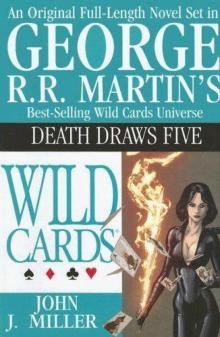 Death Draws Five wc-17
Death Draws Five wc-17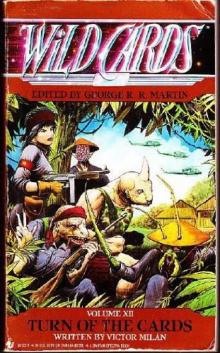 Turn of the Cards w-12
Turn of the Cards w-12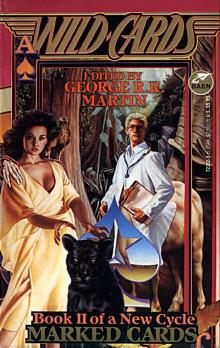 Wild Cards 14 - Marked Cards
Wild Cards 14 - Marked Cards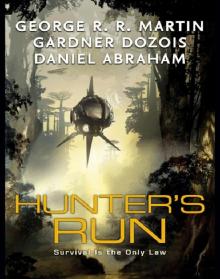 Hunter's Run
Hunter's Run The Glass Flower
The Glass Flower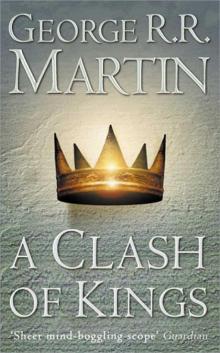 A Clash of Kings asoiaf-2
A Clash of Kings asoiaf-2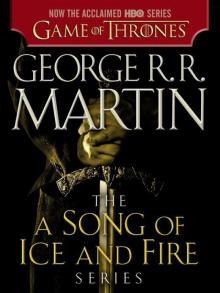 A Game of Thrones 5-Book Bundle: A Song of Ice and Fire Series: A Game of Thrones, A Clash of Kings, A Storm of Swords, A Feast for Crows, and A Dance with Dragons (Song of Ice & Fire)
A Game of Thrones 5-Book Bundle: A Song of Ice and Fire Series: A Game of Thrones, A Clash of Kings, A Storm of Swords, A Feast for Crows, and A Dance with Dragons (Song of Ice & Fire)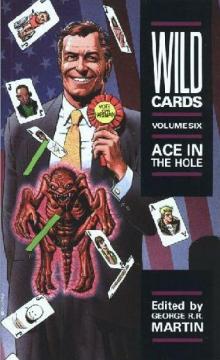 Ace In The Hole wc-6
Ace In The Hole wc-6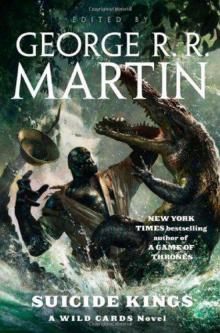 Suicide Kings wc-20
Suicide Kings wc-20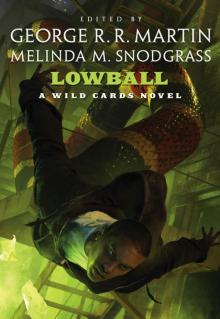 Lowball
Lowball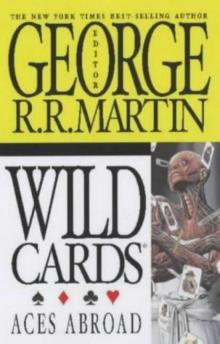 Aces Abroad wc-4
Aces Abroad wc-4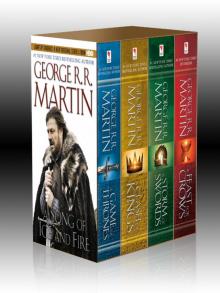 George R. R. Martin's a Game of Thrones 4-Book Bundle
George R. R. Martin's a Game of Thrones 4-Book Bundle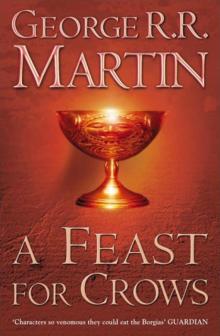 A Feast for Crows asoiaf-4
A Feast for Crows asoiaf-4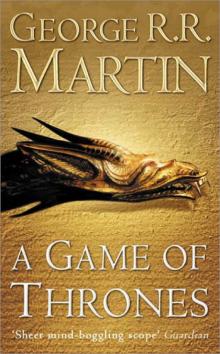 A Game of Thrones asoiaf-1
A Game of Thrones asoiaf-1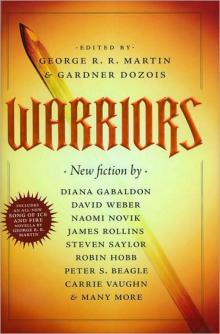 The Mystery Knight ttodae-3
The Mystery Knight ttodae-3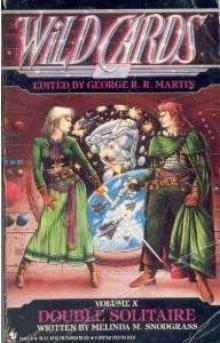 Double Solitaire w-10
Double Solitaire w-10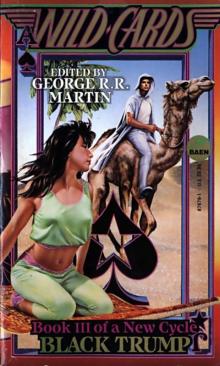 Wild Cards 15 - Black Trump
Wild Cards 15 - Black Trump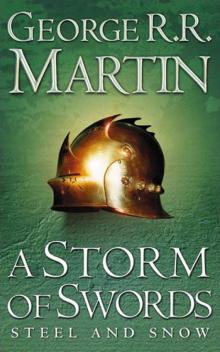 A Storm of Swords asoiaf-3
A Storm of Swords asoiaf-3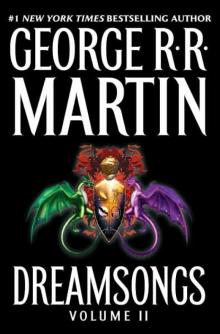 The Hedge Knight ttodae-1
The Hedge Knight ttodae-1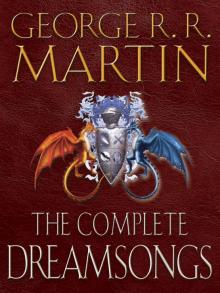 Dreamsongs 2-Book Bundle
Dreamsongs 2-Book Bundle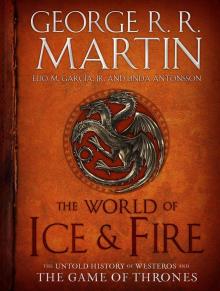 The World of Ice & Fire
The World of Ice & Fire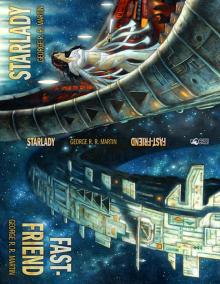 Starlady & Fast-Friend
Starlady & Fast-Friend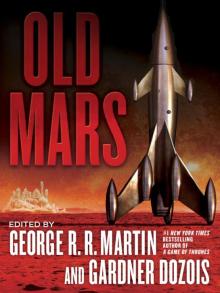 Old Mars
Old Mars Fantasy For Good: A Charitable Anthology
Fantasy For Good: A Charitable Anthology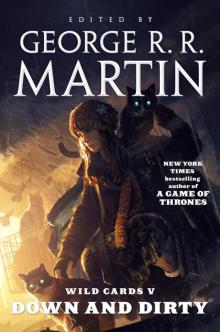 Wild Cards V
Wild Cards V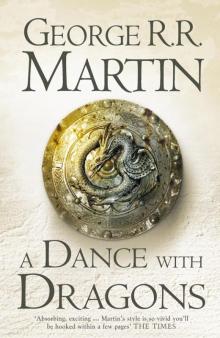 A Dance with Dragons asoiaf-5
A Dance with Dragons asoiaf-5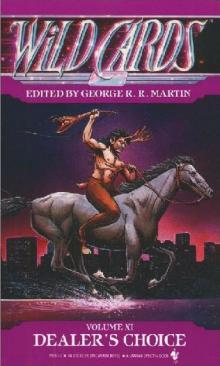 Dealer's Choice w-11
Dealer's Choice w-11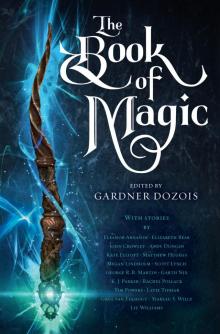 The Book of Magic
The Book of Magic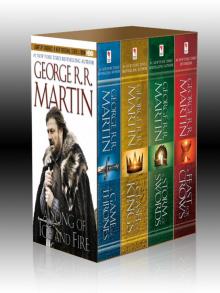 A Game of Thrones 4-Book Bundle
A Game of Thrones 4-Book Bundle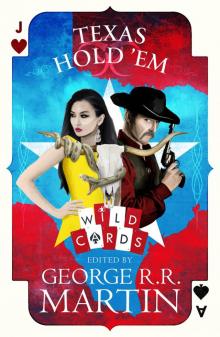 Texas Hold 'Em
Texas Hold 'Em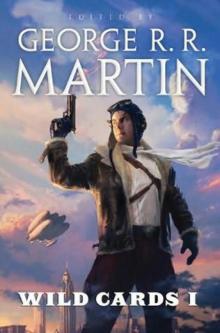 Wildcards wc-1
Wildcards wc-1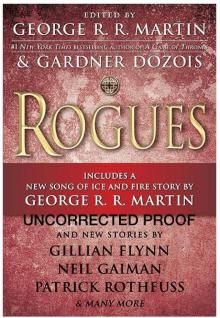 Rogues
Rogues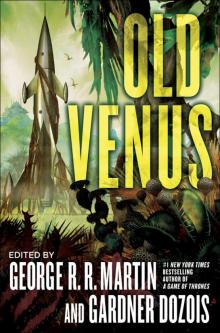 Old Venus
Old Venus